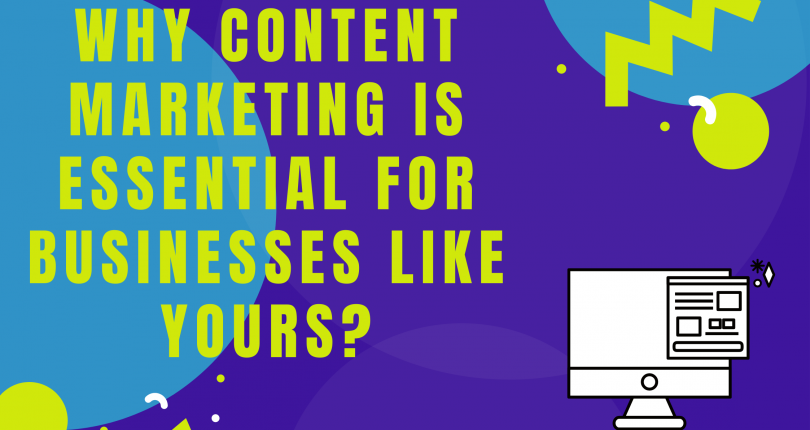Why Content Marketing Is Essential For Businesses Like Yours?

One of the main reasons people go online is to consume content, so if you don’t have a content marketing strategy you are not going to be able to reach the millions of people who are looking to consume content online.
Having good content marketing help build your business and brand reputation online, because internet users are looking for a range of content in forms such as blog posts, videos, infographics, presentations, social media posts & reports.
By offering content that is valuable in this way, you not only entice the viewer, you also begin to build brand trust. There is also the experience of the discovery of the valuable content online, that gives viewers a sense of delight in finding the right content.
Because many businesses are producing products that are being advertised, the customer’s choice of buying products narrows down through the kinds of content with which the product is being marketed. Forms of content to market products can include video, textual, image-based, or others, but one original piece of valuable content can be used to sell your product or services on multiple online platforms and channels.
Also when a potential customer comes to your website, you can use content marketing to keep them hooked and engaged. When you market your business with engaging content, there are bound to be positive results and it also links to all your digital marketing initiatives and lead to a better integration by allowing you to re-purpose the created content for emails, blogs, social media, etc. Now let’s explore deeper into content marketing.
What is content marketing?
Content marketing is a strategic marketing initiative that is focused on creating and distributing valuable, relevant, and consistent content to attract and retain your existing and potential customers, with the goal of driving profitable results.
Content development and distribution normally take the form of blogs, newsletters, white papers, social media posts, emails, videos. And when it is executed correctly, this content will convey your business expertise in your market and makes it clear that your business values the customers to whom it sells to.
The consistent use of valuable content marketing will help establish and nurture relationships with your prospective and existing customer base. When your target audience thinks of your business as a valuable contributor in their success and a credible source of advice and guidance, they are more likely to choose you when it’s time to make a transaction.
What are the best types of content for content marketing
• Blogging
• Video
• Podcasting
• Infographics
• Ebooks
• Whitepapers
• Webinars
• Slide decks
• Social media posts
How does content marketing help SEO?
Content marketing is one of the most important aspects to website SEO, because prioritising content marketing in your SEO strategy provides new, informative pieces of content that uses valuable keywords to increase exposure on search engines.
A mistake commonly made is companies over-optimising their existing content, which will eventually affect the search ranking negatively, because the search engine algorithm penalises website pages which are over optimised.
So by continuously focusing on fresh content marketing you will add more value to your business website, and most importantly, search engines like Google love new, updated and interesting content.
New and fresh published content on your website also gets quickly indexed on search engines and will contribute to the improvement of your webpage SEO ranking. And the more content that is added, strategically using your most valuable keywords, the more it improves your overall website SEO ranking.
In addition to helping your with your website search engine optimisation (SEO), content marketing helps build trust and establish a relationship with your audience. As mentioned one of the most important part of SEO is writing fresh quality content, focused on your target market. A good thing to know is that your users aren’t the only ones reading your website content, Google and other search engines also read your content whether text or video to decide where and when to show your pages in the search engine results.
How to develop a content marketing plan?
All content marketing plans are unique to the business that creates it, and there is no one size fits all template you can easily use, but here are five components that they commonly have:
Your content marketing business case
By knowing your reasons for content marketing, all the risks involved, and your vision of what content marketing success will look like, you are much more likely to figure out what type of content works best for your business.
Your content marketing business plan
This covers the goals you have for your content marketing program, the unique value you are looking to provide through your content creation, and details of your business model. It also should outline the obstacles and opportunities you may encounter as you execute your content plan.
Your content marketing audience personas
This is where you describe the specific target audiences for whom you will create content, what their needs are, and what their content engagement might look like. You will also want to map out the kinds of content you can deliver throughout the buyer’s journey in order to move them closer to your business goals.
Your content marketing brand story
Here is where you characterise your content marketing in terms of what branding ideas and messages you want to communicate, how those messages differ from your competition, and how you see the content landscape evolving once you have shared them with your target audience.
Your content marketing channel plan
This should include the platforms and channels you will use to tell your content story; what your criteria is, your processes, and the objectives are for each one; and how you will connect them so that they create a cohesive brand conversation to your customers.
How to measure the effectiveness of your content marketing?
To measure the effectiveness of your content marketing you need to be tracking and monitoring the right metrics on a web analytics platform like Google analytics. Here are 5 important metrics to measure the effectiveness of your content marketing.
1. Content Consumption Metrics
Consumption metrics are the most fundamental metrics that let you know the effectiveness of your content marketing activities and consumption metrics answer the following questions:
• How many people are viewing/downloading your content?
• How much time are they spending reading your content?
Following are the key consumption metrics:
1. Page Views: This metric tells you the total number of pages viewed. In Google Analytics, Behavior —> Site Content —> All Pages will give you an overview of top performing pages.
2. Unique Visitors: Also known as Users, this metric gives you the size of your audience.
3. Average Time on Page: This lets you know how much time users spend on your website. So, you get to know if users are actually reading the content or just briefly glancing through the pages.
4. No. of Downloads: With this metric, you understand how many people took time to fill out a form to access gated content on your website.
2. Content Retention Metrics
Content Retention metrics allow you to track how well your content is able to retain your existing website visitors. Retention metrics help you understand:
• How many users come back to consume your content?
• How often do they come back?
Following are the key content retention metrics:
1. Bounce Rate: Bounce rate is the percentage of visitors who leave your website after viewing only one page. A high bounce rate indicates that your content is not good enough for the user to stay on the web page. If you see a high bounce rate consistently, it’s time to revisit your content strategy. Also, check Users Flow report under Audience section in Google Analytics to understand where the user is actually leaving the website
2. Percentage of New vs. Returning Visitors: If the percentage of returning visitors is higher than the percentage of new visitors, it means your content is doing a good job of retaining visitors.
3. No of Unsubscribes: The number of unsubscribes count shows how well your content is being received by your existing users. Keep a track of opt-outs from your email marketing list to understand if your content needs any updates.
3. Content Engagement Metrics
So how do you know if your target audience is loyal to your brand? Engagement metrics shed light on that aspect of analytics. Engagement metrics come quite close to consumption and retention metrics. They tell you more on how involved your audience is with your content.
Here are the key engagement metrics:
1. Blog Comments: Track how many comments readers are posting in the comments section of your blog. Not all comments are going to be helpful. See if you can find any comments that can be used as a feedback. Also, observe what type of content generates better engagement.
2. Page Depth: Also known as pages per session, this metric gives you the average pages your audience visits per session.
3. Click-Through Rate: CTR is the ratio of the clicks on the links to the views it garnered. If people are clicking on the call to action (CTA) present in your content, it tells you that your content motivated your visitors to click on the CTA to engage further.
4. Social Media Engagement: This metric tells you how many likes, comments, favourites etc. your content generated on different social media platforms.
4. Content Sharing Metrics
Content sharing metrics directly show the success of your content in generating brand awareness. People share content that is informational, useful or entertaining. People are motivated to share content that reflects their beliefs.
Key content sharing metrics are:
1. Social Media Shares: Monitor various social media metrics like shares, retweets, re-pins etc. that your content is receiving. This will help you understand what type of content resonates best with your target audience.
2. Email Forwards: Track how many email subscribers clicked on the Forward-to-a-Friend button to measure the performance of your email. Compare it with previous email campaigns to see what type of email motivated the subscribers to share it ion their network.
5. Lead Generation Metrics
Lead generation is the number one priority for content marketing as you are just one step away from converting attention into business revenue. So how do you justify the ROI on your content marketing initiatives? Lead generation metrics help you do that. Lead metrics inform you about new leads and where they have come from.
Below are some important lead generation metrics:
1. Gated Content Downloads: If you have downloadable content such as ebooks, reports, presentations or white-papers on your website, the download count specifies number of downloads generated by each piece of content. Setup Goal Completions in Google Analytics to track this metric to know the exact count and its referral sources.
2. New Newsletter Subscribers: Similar to gated content downloads, if a user signs-up for your newsletter whilst on the blog, it shows a strong indication of staying updated with your latest content.
In order to get the best picture of whether your content marketing has been effective, you will need to combine your various consumption metrics with retention metrics helps in understanding how well your content supports audience retention. Engagement metrics guide you towards developing engaged audience which can be converted into customers if followed-up with the right lead generation tactics. And If your content is able to generate shares on social media and other platforms, then you can be sure that your content marketing game is on point.










